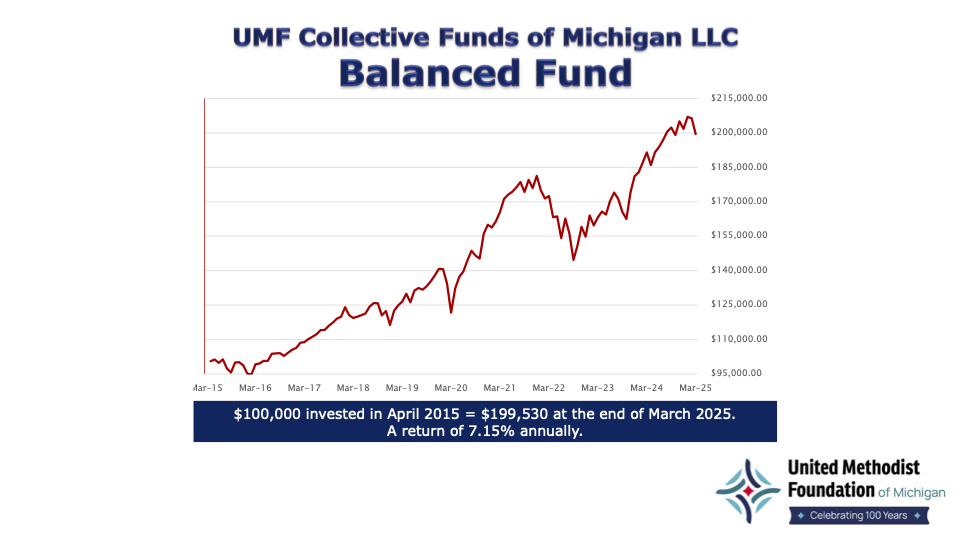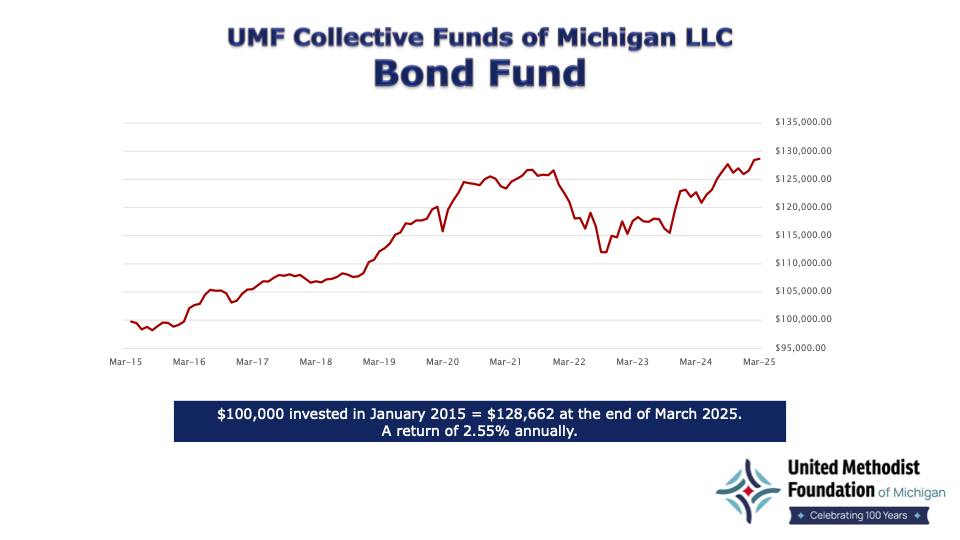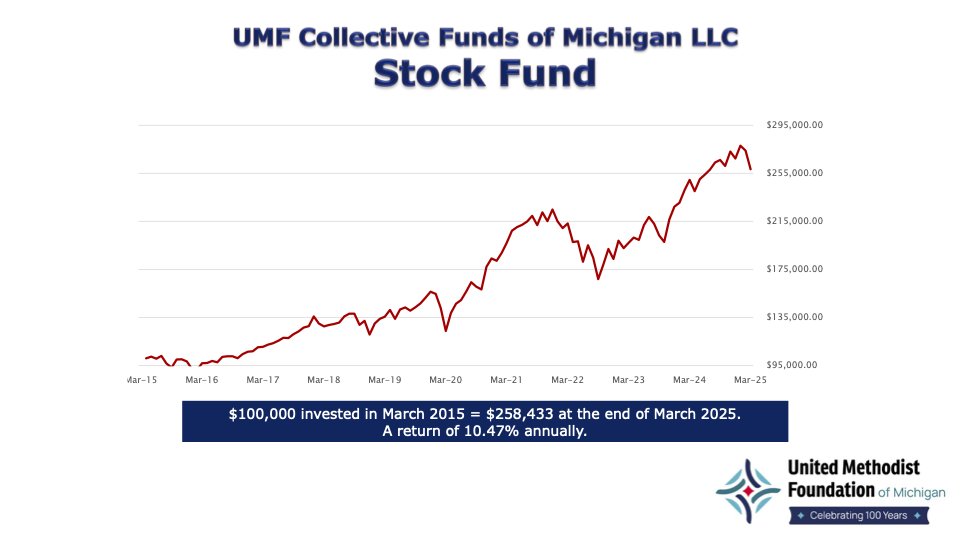Investment Funds
We provide value-aligned, socially responsible investment funds that allow investors to choose a specific asset allocation mix of equities and fixed income or a balanced fund. You can feel confident knowing that your resources are safely invested with companies that produce products or engage in activities consistent with our beliefs and values. Learn more about the UMF Collective Investments Funds of Michigan LLC today and discover why we are the preferred provider of investment services to United Methodist ministries throughout Michigan.
Historical Fund Performance
Here are the current performance figures, net of the typical investment management fee, for the UMF Collective Funds of Michigan LLC. This information is updated monthly as the information becomes available, so please check back often to see how each fund is progressing.
| Monthly/Year | Stock Fund | Bond Fund | Balanced Fund |
|---|---|---|---|
| YTD 2025 | 3.14% | 2.59% | 2.92% |
| May 2025 | 7.03% | -0.16% | 4.15% |
| April 2025 | -0.31% | 0.56% | 0.04% |
| March 2025 | -5.65% | 0.18% | -3.32% |
| February 2025 | -1.47% | 1.47% | -0.29% |
| January 2025 | 3.99% | 0.50% | 2.59% |
| 1 Year* | 17.60% | 2.45% | 11.39% |
| 3 Year* | 5.93% | -0.18% | 3.64% |
| 5 Year* | 11.31% | 1.31% | 7.46% |
| 10 Year* | 10.47% | 2.50% | 7.43% |
Investment Growth Graphs
These growth charts are based on historical annualized returns. The charts begin with an initial investment of $100,000 in the particular fund.
For more information about the performance of the UMF Collective Funds of Michigan LLC and asset allocation options, please contact us.


Socially Responsible Investment Policy
We are committed to demonstrating responsible investing values that reflect the Social Principles of The United Methodist Church. We seek to limit investments in companies producing products or engaging in activities inconsistent with these values. Companies not falling into any of these categories may still be ineligible for investment because of reputation, public image or any specific business practices determined to be inconsistent with the Social Principles of The United Methodist Church.
Companies that generate revenue from alcoholic beverage-related business activities equal to or greater than 10% of recent year revenues (generally three years).
Companies receiving revenues from the production, sale, or distribution of products or services that are considered pornographic or meet the legal definition of “obscene” or “harmful to minors.”
Companies that manufacture tobacco products.
Companies that manufacture firearms or related ammunition products for non-military markets.
Companies that generate revenue from gaming-related business activities (including casinos, racetrack owners or operators and gaming equipment suppliers) equal to or greater than 10% of recent year revenues (generally three years).
- Department of Defense Contracting: Top 25 publicly traded companies ranked by the amount of revenue generated as a prime contractor on contracts of any type with the United States Department of Defense.
- Weapons-Related Department of Defense Contracting: Companies that generate revenue from contracts with the United States Department of Defense for conventional or nuclear weapons (including armaments and delivery platforms but not support systems) equal to or greater than 20% of recent year revenues (generally three years.)
Companies that materially demonstrate a prolonged and systematic pattern of business practices determined to result in human rights violations, including but not limited to abusive labor practices and exploitation of child labor, may be restricted from investment.

Related Forms
- The UMF Collective Investment Fund of Michigan Offering Circular
- Authorization for Withdrawal and Deposit Form
- Change Annual Allocation
- Consent to Electronic Deliver of Documents Form
- Signature Authorization Form
- Participant Application & Agreement Form
- United Methodist Foundation of Michigan Financial Statement
- Endowment Charter Policy (Sample)
- Account-Church Change Form
Frequently Asked Questions:
The Foundation has served Michigan congregations since its inception in 1926. We provide value-aligned, socially responsible investment funds that allow investors to choose a specific asset allocation mix of equities and fixed income or a balanced fund. We partner with highly respected investment advisors and world-renowned fund managers to offer investors exceptional, value-aligned investment opportunities. We actively participate in shareholder engagement and proxy voting which adheres to a principle-centered approach and sustainable investing.
The Foundation offers professional investment management as part of our comprehensive stewardship ministry. We pool funds entrusted to us by congregations and related ministries. We retain professional fund managers at a fee structure that only the very largest churches could obtain individually. We believe that it is critical for congregations to make a witness through their investments. We recognize our stewardship responsibility to ensure that Foundation funds are invested consistent with the Social Principles of The United Methodist Church. Accordingly, we require all our fund managers to screen investments using a rigorous process that considers products, environmental impact, community relationship, and corporate citizenship.
Extensive diversification is achieved through the use of five separate equity managers, each with a dedicated style of investing.
The Foundation is a not-for-profit ministry. As such, we do not serve stockholders, but our constituents. We do not need to maintain branch offices nor do we employ a sales force. We keep our costs low and pass through the savings to our clients. We come alongside local church leaders and congregations to help further your ministry. Beyond investment counsel, we offer a wide variety of complimentary services to churches, including financial stewardship consultation, planned giving programs, and estate and financial planning workshops. All these services are provided without charge to our constituent churches.
The Foundation pools church funds in the UMF Collective Investment Funds of Michigan LLC to create a critical mass to be invested. We have negotiated an all-inclusive fee structure of 1% (100 basis points) charged annually for clients with investment accounts totaling less than $1M. For clients with investment accounts in excess of $1M, but less than $3M, we offer a 0.2% (20 basis points) rebate. For clients with accounts totaling $3M or more we increase the rebate to 0.3% (30 basis points). These fees include ALL costs for management, custody, and transactions. An additional administrative fee of $50 is assessed per account annually.
The majority of our investment accounts are endowment funds that share the stated goal of long-term growth as well as current income. Accordingly, we recommend a significant portion of assets be invested in common stocks along with a portion in fixed income assets. The UMF Collective Investment Fund of Michigan LLC offers complete asset allocation discretion for each investor. Investors may select any percentage combination between the Stock Fund, Bond Fund, and Money Market Investment Account. We are frequently asked to keep the church’s account “balanced,” in which case we maintain the assets in the Balanced Fund, currently a blend of 60% Stock Fund and 40% Bond Fund. The Foundation has several resources that can assist a committee in determining asset allocations. Check our publications and stewardship resources for more information. In addition, we offer individual consultations. Please contact us for more information.
No, we serve churches and ministry organizations which share common bonds, convictions, or heritage with the Wesleyan movement. In fact, the Foundation historically has served a broader market than exclusively United Methodist.
Foundation accounts are demand accounts and valued weekly. Requests for funds are processed weekly (account closing may take a few extra days.) We maintain liquid reserves to provide for flexible access to your funds.
We have retained Rockefeller Financial LLC to serve as a discretionary investment advisor. Their fiduciary role is to manage the entire portfolio in accordance with the investment objectives, policies, and restrictions. BlackRock provides the actual security selection and executes the necessary trades to accomplish the stated goals of the Stock Fund through five diversified equity strategies. In addition, BlackRock actively manages the fixed income positions for half of the Bond Fund. The fixed income assets for the other half of the Bond Fund are selected by Rockefeller. Both BlackRock and Rockefeller monitor the practices of the several fund managers to ascertain their compliance with their disciplines. Axiom Wealth Partners serve as representatives of Rockefeller, provide linkage between BlackRock, Rockefeller Financial LLC, and the Foundation, and communicate directly with Foundation senior management and the Board Investment Committee.
Statements are available monthly.
The Foundation offers a money market fund that provides an institutional rate of return, often superior to similar money market funds. We do not charge a mark-up fee for The Money Market Fund. We only pass through the costs incurred.
The bond fund is composed equally of two distinct portfolio strategies that combine to offer a dynamic and diversified approach:
Fundamental Core Fixed Income
- seeks total return derived from coupon interest and capital appreciation
- consists primarily of investment grade corporate bonds
- may also invest in U.S. government securities, asset-backed and mortgage-backed bonds
- managed actively with a preference for the shortest maturity and highest quality rating while striving to maximize total return
- expected to have a duration of two to five years
Core Plus Fixed Income
- allocates assets to investment grade corporate bonds, government securities, preferred securities, and taxable municipal issues
- may also take minimal positions in real estate investment trusts (REITS) and high yield bonds
- a laddered portfolio with tactical investments at different points in the yield curve
- currently, overweight in securities with a maturity of under seven years
The Stock Fund is comprised of five best-in-class equity strategies. Each strategy is managed by a top-rated, highly experienced asset management team. Together, they create a value-aligned, diversified global portfolio.
International Equity Strategy
Seeks long-term capital appreciation. They invest primarily in equity securities of large capitalization companies domiciled in developed countries and markets outside of the United States.
Large-Capitalization Core Strategy
Seeks long-term capital appreciation. They invest primarily in equity securities of large-capitalization companies domiciled in the United States.
Large-Capitalization Growth Strategy
Seeks long-term capital appreciation. They invest primarily in growth-oriented equity securities of large capitalization companies domiciled in the United States.
Large-Capitalization Value Strategy
Seeks long-term capital appreciation and current income. They invest primarily in dividend-paying securities of large-capitalization companies domiciled in the United States.
Mid-Capitalization Value Strategy
Seeks capital appreciation and, secondarily, income. They typically invest at least 80% of their assets in equity securities of medium-capitalization companies. They focus on the securities of companies with long term growth potential, a high probability of becoming more profitable, or a current stock value likely to rise.




